In this article:
Kiwi fruit is a treat not just for your tongue but also for your skin. They have an impressive nutritional profile that makes them a healthy addition to your diet, and they can be a great addition to your skin care arsenal as well.
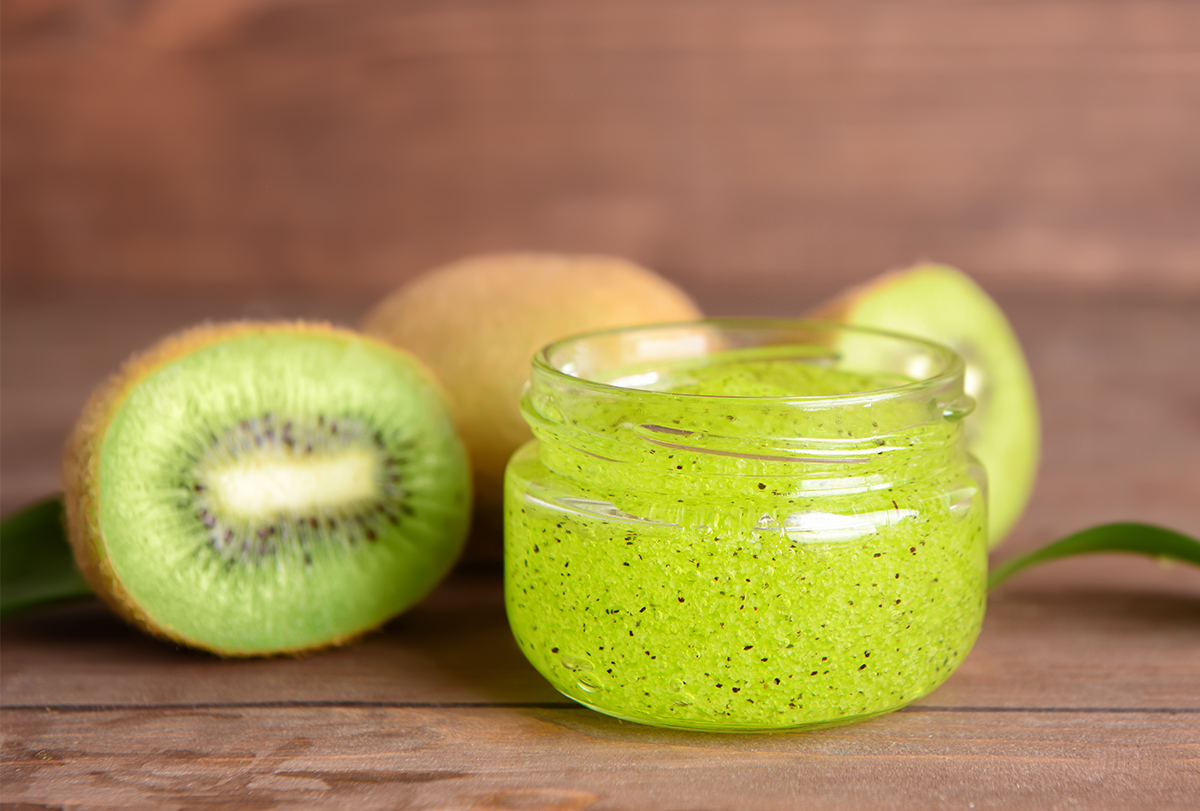
Kiwis have been used topically in a variety of beauty remedies to enhance the texture, appearance, and overall quality of your skin.
This article talks about different refreshing, hydrating face masks that use kiwi and other skin-rejuvenating boosters right from your kitchen shelf. You can adjust the quantity of the ingredients to make the mask suitable for your skin type.
These easy-to-prepare masks are a much more affordable and safer option than overpriced and chemical-containing facial masks available on the market. Using these masks once a week can revitalize your skin, help it heal, and protect it from further damage.
Know Your Ingredients
DIY kiwi face masks can easily be prepared with the following ingredients, each with its own skin benefits.
1. Kiwi fruit
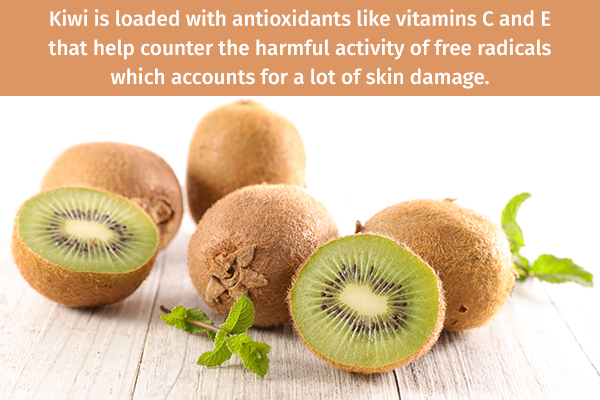
Kiwi, also known as the “king of vitamin C,” is good for the skin in multiple ways. It is loaded with antioxidants, such as vitamins C (1) and E, (2) that help counter the harmful activity of free radicals, which accounts for a lot of skin damage.
Free radicals are unstable molecules present in the body and the environment that unleash considerable oxidative stress within the tissues to cause some degree of cellular and DNA destruction. This kind of cellular damage leads to the formation of wrinkles, fine lines, and other premature signs of skin aging.
The antioxidants in kiwi not only eliminate or neutralize these harmful free radicals but also promote skin repair to undo the damage already done. Vitamin C also aids the production of collagen, which is the main skin-building protein, and imparts moisture to your skin.
Applying kiwi to your face can also help restore and maintain the natural pH of the skin, which is slightly acidic, and thereby can make it inhospitable for the growth of microbial infections. If your skin becomes too alkaline, it will be more vulnerable to bacterial skin infections such as acne.
Lastly, kiwi fruit may serve as a mild exfoliating agent for your sensitive facial skin.
2. Yogurt
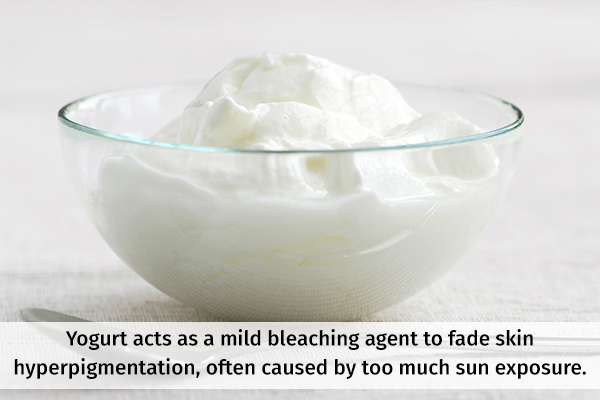
Lactic acid is a type of alpha hydroxy acid found in yogurt. It helps dissolve the dead cells on the surface of the skin to make them shed easily and then be replaced by new ones.
This gentle exfoliation process reveals fresh skin from underneath to impart a healthy glow to your face. (3) Lactic acid also helps keep your skin suitably acidic to ward off skin microbes such as the acne-causing staphylococcus that generally thrives in alkaline conditions.
It also acts as a mild bleaching agent to fade skin hyperpigmentation, often caused by too much sun exposure. (4) If you are out of yogurt, you can use milk or milk cream, which are also good sources of lactic acid.
3. Banana

Bananas are full of bioactive compounds and nutrients, including polyphenols, carotenoids, vitamin K, and minerals, that nourish your skin to improve its structure and appearance. They help limit free radical activity, which is a major contributor to premature skin aging.
When applied to the face, bananas can also help lighten your skin and reduce hyperpigmentation for a more even complexion. (5)
4. Vitamin E oils
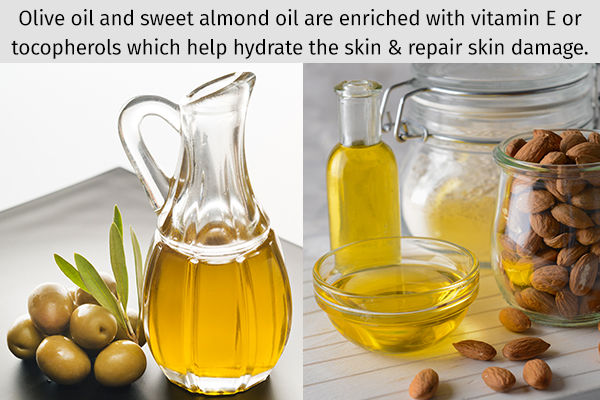
Olive oil and sweet almond oil are enriched with vitamin E (or tocopherol) that helps hydrate the skin and repair skin damage. Its anti-inflammatory properties help facilitate skin repair and also protects the skin from sun damage and the side effects of chemotherapy.
Vitamin E also works as an antioxidant to curb the oxidative stress caused by free radicals on skin cells, which is often the source of premature skin aging. This skin-nourishing vitamin is also good for your immunity and can help you ward off infection and illnesses that affect the skin.
Lastly, it can deeply moisturize the skin to keep it soft and supple. (2)
5. Oatmeal
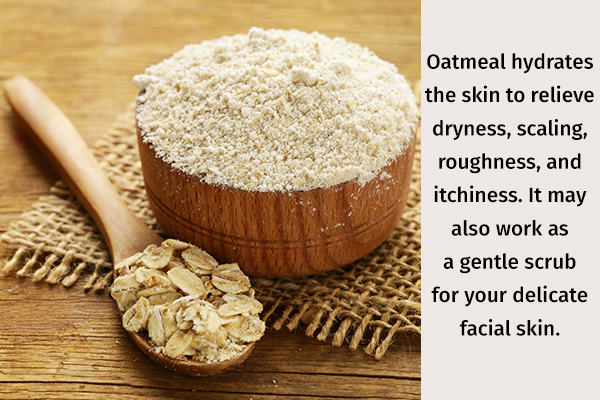
The widespread use of oatmeal in skin products and remedies is testament to its dermatological benefits.
The topical use of colloidal oatmeal extracts was shown to limit the release of certain inflammation-causing proteins called cytokines to reduce swelling, redness, itchiness, and other skin discomforts triggered by underlying inflammation.
Plus, oatmeal hydrates the skin to relieve dryness, scaling, roughness, and itchiness. (6)(7) It may also work as a gentle scrub for your delicate facial skin.
DIY Face Mask Recipes
Here are some common kiwi face mask recipes for different types of skin.
Caution: Patch test the mask on the underside of your arm or your neck before putting it on your face to make sure that you are not allergic to any of its ingredients.
Recipe 1: For dry, flaky skin
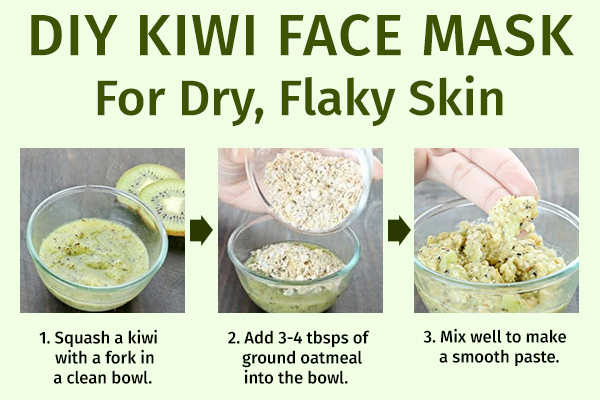
- Squash a kiwi with a fork in a clean bowl.
- Add 3–4 tablespoons of ground oatmeal.
- Mix all the ingredients well to make a smooth paste.
Recipe 2: For acne-prone skin
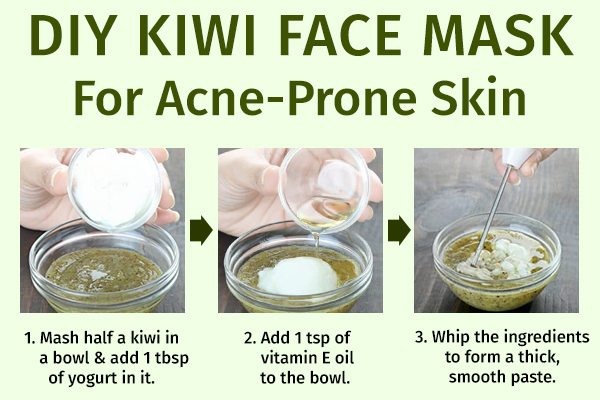
- Mash half a kiwi in a bowl.
- Add 1 tablespoon of yogurt.
- Add 1 teaspoon of vitamin E oil.
- Whip all the ingredients to form a thick, smooth paste.
Note: If you are out of yogurt or are allergic to it, use honey instead. While honey does not have the lactic acid found in yogurt, it does have other antimicrobial compounds that can help fight skin infections such as acne. Plus, it is a natural humectant, which means it traps moisture in your skin to keep it hydrated for longer.
Recipe 3: For all skin types
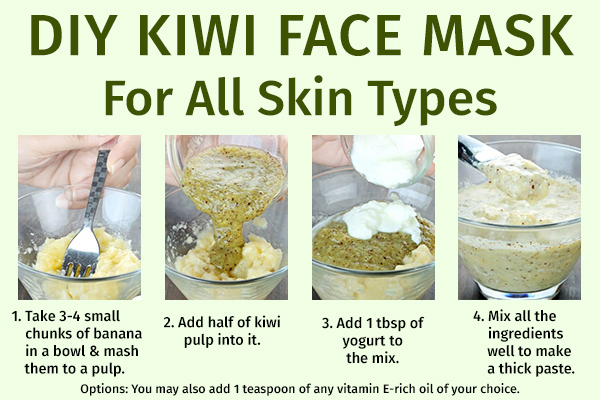
- Take half a kiwi and 3–4 small chunks of banana in a bowl and mash them to a pulp.
- Add 1 tablespoon of yogurt to the mix.
- You may add 1 teaspoon of any vitamin E-rich oil of your choice.
- Mix all the ingredients well to make a thick paste.
Note: People with normal skin can choose any one of the above-listed remedies according to the availability of ingredients.
How to Apply the Face Mask
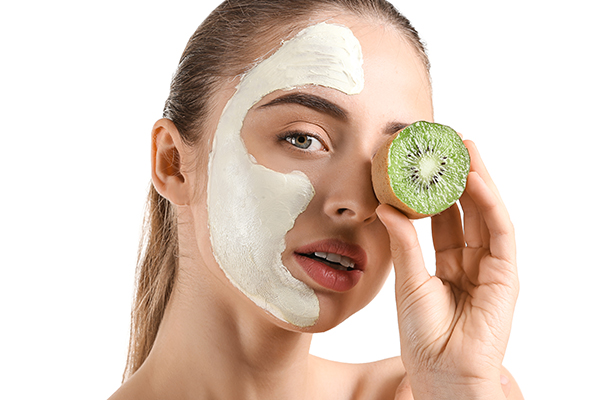
- Remove all makeup and wash your face.
- Apply the paste evenly to your face and neck.
- Let it sit for 20–30 minutes so that the nutrients are absorbed into the skin.
- Soak a soft washcloth in warm water, wring out the excess liquid, and gently wipe your face with it to remove the mask. Make sure that the water is only mildly warm and not hot enough to irritate or burn your sensitive facial skin.
- Once the mask is off, thoroughly rinse your skin with water and pat it dry.
- While the skin is still damp, apply a gentle moisturizer all over the face and neck and cover it up with sunscreen during the day.
Tips For Easy Application
Here’s how you can tweak the consistency of your mask to make sure it does not drip from your face or become too dense to apply:
- If the face pack paste is too thick, you can dilute it with a bit of water, but don’t make it runny.
- If your face mask is too runny, you can add some ground oatmeal or gram flour to the mixture to thicken its consistency.
Final Word
Kiwi face mask benefits all skin types but is especially good for oily and acne-prone skin. However, people with dry skin should not use it too often as it is slightly acidic and can further irritate the skin.
Bear in mind that no single topical remedy or face mask can improve the condition of your skin on its own. It can offer instant skin rejuvenation, but the effect will wear off if you don’t use the remedy regularly as part of a wholesome skin care routine.
Besides, superficial care for the skin can only do so much. You must couple it with a healthy diet and lifestyle to achieve long-lasting skin improvement.
- Was this article helpful?
- YES, THANKS!NOT REALLY


